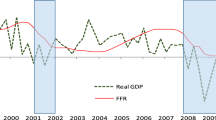Abstract
Data revisions routinely introduced by the World Bank can lead to significant revisions in empirical results. We show this by re-estimating our aggregate indicator for predicting the 1997 Asian crisis utilizing the 1999 and 2004 updates of the 1996 World Bank data and comparing these results to those we obtained (this Journal, 2000) for predicting the same event using the original, unrevised, 1996 World Bank data. Since most data-gathering organizations routinely revise their data, this may represent a much greater problem for policy makers than might be recognized.
Similar content being viewed by others
References
Chauvet, M. and F. Dong (2004) “Leading Indicators of Country Risk and Currency Crises: The Asian Experience.” Economic Review, Federal Reserve Bank of Atlanta 12(1):25–37.
Ghosh, S.T. and A.R. Ghosh (2003) “Structural Vulnerabilities and Currency Crises.” IMF Staff Papers 50(3):481–506.
Greene, W.H. (2002) Econometric Analysis, 5th ed. Prentice Hall: Upper Saddle River, NJ.
Kaminski, G., S. Lizondo and C. Reinhart (1998) “Leading Indicators of Currency Crises.” IMF Staff Papers 45(1):1–45.
Morgenstern, O. (1963) On the Accuracy of Economic Observations. Princeton: Princeton University Press.
Patterson, K.D. and S.M. Heravi (1991) “Are Different Vintages of Data on the Components of GDP Co-Integrated? Some Evidence from the United Kingdom.” Economics Letters 35:409–413.
Runkle, D. (1998) “Revisionist History: How Data Revisions Distort Economic Policy Research.”Federal Reserve Bank of Minneapolis Quarterly Review 22(4):3–12
Reagle, D. and D. Salvatore (2000) “Forecasting Financial Crises in Emerging Market Economies.” This Journal 11(3):247–259.
Salvatore, D. (1998) “Capital Flows, Current Account Deficits, and Financial Crises in Emerging Market Economies.” International Trade Journal 12(1):5–22.
Salvatore, D. (1999) “Could the Financial Crisis in Asia Have Been Predicted?” Journal of Policy Modeling 31(3):341–348.
Santangelo, G. (2004) “Analysis of International Data Revision: Theory and Application.” Fordham University Dissertation.
World Bank (1999) World Development Report 1998/9. Washington, DC: World Bank.
World Bank (2004) World Development Indicators. Washington DC: World Bank.
Author information
Authors and Affiliations
Rights and permissions
About this article
Cite this article
Reagle, D., Salvatore, D. Robustness of Forecasting Financial Crises in Emerging Market Economies with Data Revisions—A Note. Open Econ Rev 16, 209–216 (2005). https://doi.org/10.1007/s11079-005-5876-0
Issue Date:
DOI: https://doi.org/10.1007/s11079-005-5876-0




